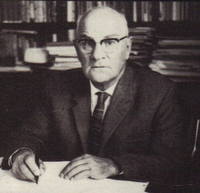DOCTOR OF PHILOSOPHY (HONORIS CAUSA)
 Andries Charles Cilliers was born at Wellington, in the Cape Province, on 1 January 1898. After matriculating at the Paarl Gymnasium in the First Division of the First Class, be was placed second in the Union in the Hoogste Taalbond and Intermediate Examinations in 1916.
Andries Charles Cilliers was born at Wellington, in the Cape Province, on 1 January 1898. After matriculating at the Paarl Gymnasium in the First Division of the First Class, be was placed second in the Union in the Hoogste Taalbond and Intermediate Examinations in 1916.
After obtaining the degree M.Sc. (cum laude) at the University of Stellenbosch in 1919, he studied theoretical physics at the Universities of Giittingen and Frankfort-am-Main in Germany, passing the doctoral examination summa cum laude.
Upon his return to South Africa, he was appointed senior lecturer in mathematics at the University of Cape Town. In 1925 he was appointed senior lecturer in theoretical physics at the University of Stellenbosch, and in 1939 he was promoted to the chair in theoretical physics, which he occupied until his retirement in 1963. During this period, he was Dean of the Faculty of Science, represented Senate on the Council of the University of Stellenbosch for a period of 16 years, and served as a member of the Vice-Chancellor’s Committee and many other committees. He played an important role in the development of the University of Stellenbosch, and during those years became convinced that State aid to the universities was totally inadequate. It was this experience which enabled him in later years to make an important contribution to our universities.
From the inception of his university career until recently A.C Cilliers actively contributed to many fields, within and outside the scope of his speciality. For almost half a century he directed his bubbling energy into those related fields in which he repeatedly made contributions, be it by way of publication, academic memorandum, address or radio talk.
Physics and mathematics constituted his special fields, and yet he was equally conversant with the humanities. His knowledge of and insight into political science, economics, the other social sciences and even literature, enabled him to publish extensively on university affairs, race relations and politics, water conservation, the limitation of the growth of and the decentralization of industries, and birth and population control. He also reviewed philosophical works and published work of an autobiographical and historical nature.
Intellectual effort of this kind requires mental relaxation. Throughout his full and adventurous life, he, being of farming stock, always returned to nature, replenishing his strength by fishing, hunting and golfing, before applying himself afresh and cheerfully to the struggle in the diverse fields of his interest.
It was this love of nature that led him to become a driving force behind a more effective Department of Nature Conservation. A conservative and patriotic scholar, he is at the same time original, logical and realistic. Most political groups respect him, and his opinions are influential in many circles. In 1946 he was nominated a member of the Suid-Afrikaanse Akademie vir Wetenskap en Kuns. He was thereafter appointed a member of the Atomic Energy Board.
He played a leading role in the reconciliation between Generals Smuts and Hertzog, and throughout his life retained his interest in our most pressing political and social problems. During the past few years he initiated the movements which led to legislation regulating the partition of agricultural land, as well as legislation establishing a restructuring of the number of constituencies in South Africa. All these intellectual creations were brought about by undaunted determination and dynamic drive, coupled with courage, an exceptional zest for life, and humour.
The central theme in A. C. Cilliers' life has been the combating and curtailment of unrestricted growth, not only in nature, but also and especially in relation to the great man-made crisis: the pressure of population in the twentieth century. His Life on the Sigmoid (1947) is a reformulation of the Malthusian principles in this connection. His criticism of the holistic philosophy of Smuts was regarded by the latter as stimulating, particularly in view of the fact that it acknowledged the forming of restricted wholes only, as opposed to Smuts' all-embracing holistic concept. This theme of controlled growth also finds application in Cilliers' view of the nature, role and structure of universities. In his endeavour to improve State aid to universities a door was opened for him with his appointment, in 1961, as chairman of a committee of inquiry into the subsidy formula for universities.
Two years later this committee submitted its report, which had far-reaching financial implications. This report was implemented by the Government in virtually all respects. During the years 1964-1973 he served as chairman of the University Advisory Committee. His proficient service in this respect was generally acknowledged. At the conclusion of 1967 he submitted a comprehensive report to the Government concerning the revision of the State subsidy for universities for the period 1969 to 1974.
It is this report, amongst other things, which Ied to the appointment of a commission of enquiry into universities in South Africa. Three universities have already honoured Professor Cilliers for his work in aid of higher learning in South Africa.
A.C Cilliers has rendered distinguished service as an academician and as a social scientist and has made a significant contribution especially to the financial welfare of South African universities in general and the smaller universities in particular.
The University of Port Elizabeth regards it a privilege to be able to award he degree of DOCTOR PHILOSOPHIAE, HONORIS CAUSA to Professor Cilliers.